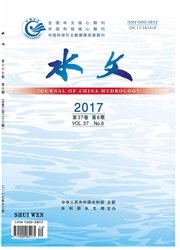

 中文摘要:
中文摘要:
随着气候变化和人类活动对水资源影响越来越显著,大量水文序列的统计规律不再满足一致性要求而出现了变异。水资源日益重要的社会地位,要求在对水文变异进行检测的同时,需进一步量化影响其变异的因素.但目前归因分析的研究仍以定性或半定量为主。由于降雨和径流是水循环中关键的水文要素。且分别可以反映气候变化和人类活动对水资源的影响,利用降雨一径流关系提出了定量研究水资源变异的归因分析方法。结合乌力吉木仁河三级区1956~2000的年径流和年降雨序列。在对其分别进行变异诊断的基础上,定量地分析了造成该区水文变异的原因。计算结果表明:气候变化对鸟力吉木仁河三级区水资源变异的贡献率为24%,而人类活动影响的贡献率为76%,可见人类活动是造成该区水资源变异的主要因素。
 英文摘要:
英文摘要:
Climate changes and human activities have had more and more effects on water resources. It makes statistical regulations of hydrological series no longer be consistent, which means the hydrological series have alteration. Increasingly important social- roles of water resources require not only study on the hydrological alteration, but also the quantitative attribution analysis. Whereas, the attribution analysis methods are still at qualitative or semi-quantitative levels. Because the rainfall and runoff are the key hydrological elements in the water circulation, and they could reflect the impact of climate changes and human activities at the same time, the attribution analysis of water resources alteration method in quantitative is proposed with rainfall-runoff relationship in this paper. With the annual runoff and precipitation data of the third grade Wulijimurenhe from 1956 to 2000 years, based on the re- suits of alteration diagnosis, the attributions that caused the hydrological alteration were analyzed in quantitative. And the results show that the contribution rate of climate changes to the alteration of water resources of the third grage Wulijimurenhe is 24%, and the contribution rate of human activities is as large as 76%. It is obvious that the extensive human activities is the main factor.
 同期刊论文项目
同期刊论文项目
 同项目期刊论文
同项目期刊论文
 Spatio-temporal patterns of hydrological processes and their responses to human activities in the Po
Spatio-temporal patterns of hydrological processes and their responses to human activities in the Po Impacts of climate change and human activities on surface runoff in the Dongjiang River basin of Chi
Impacts of climate change and human activities on surface runoff in the Dongjiang River basin of Chi Changing properties of hydrological extremes in south China: natural variations or human influences?
Changing properties of hydrological extremes in south China: natural variations or human influences? Multiscale streamflow variations of the Pearl River basin and possible implications for the water De
Multiscale streamflow variations of the Pearl River basin and possible implications for the water De Precipitation variability (1956~2002) in the Dongjiang River (Zhujiang River basin, China) and assoc
Precipitation variability (1956~2002) in the Dongjiang River (Zhujiang River basin, China) and assoc Statistical behaviours of precipitation regimes in China and their links with atmospheric circulatio
Statistical behaviours of precipitation regimes in China and their links with atmospheric circulatio Estimation of evapotranspiration using remotely sensed land surface temperature and the revised thre
Estimation of evapotranspiration using remotely sensed land surface temperature and the revised thre The Influence of dam and lakes on the Yangtze River streamflow: Long-range correlation and complexit
The Influence of dam and lakes on the Yangtze River streamflow: Long-range correlation and complexit 期刊信息
期刊信息
